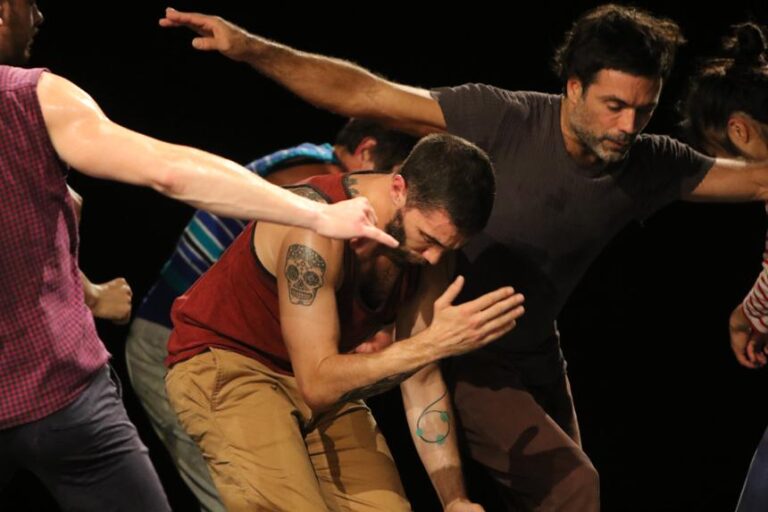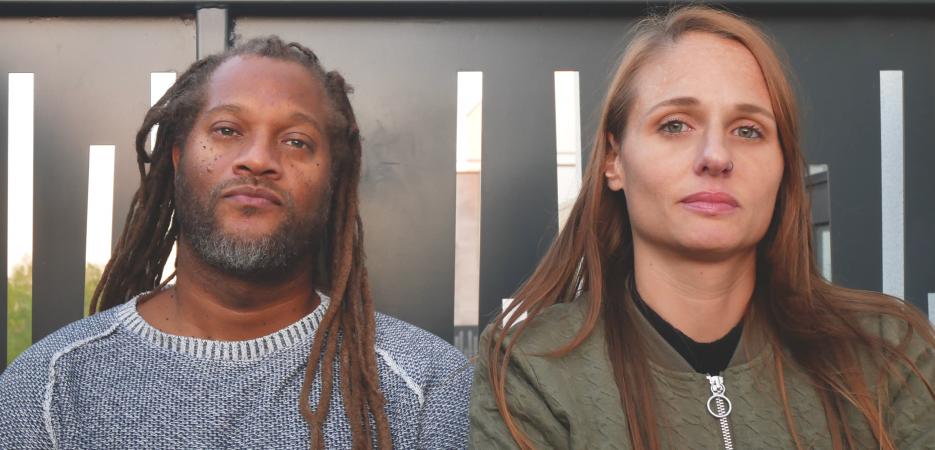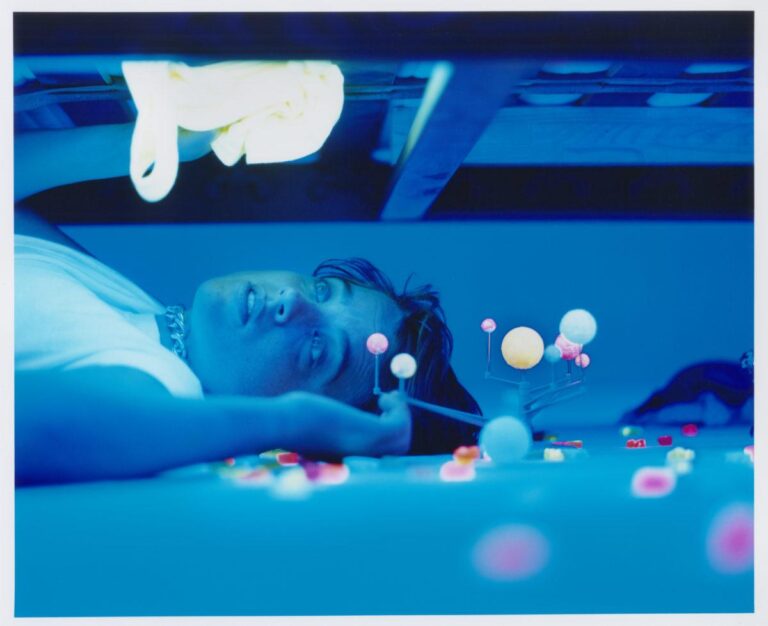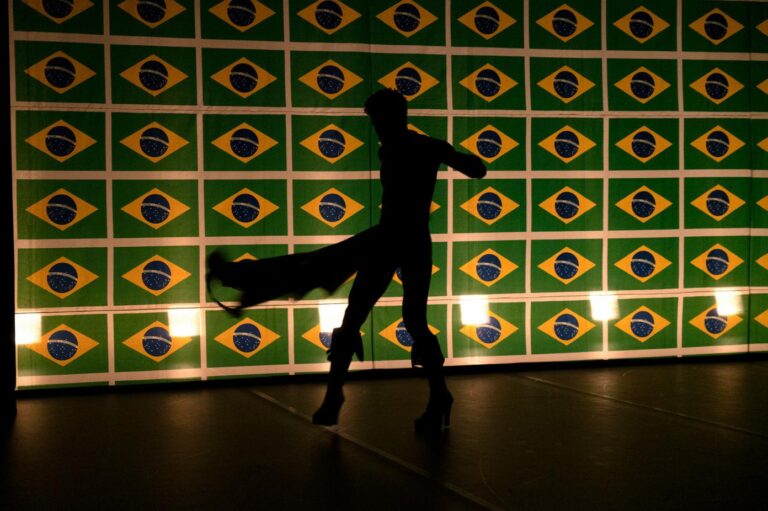
Éloïse Bouton & D’de Kabal
Authors
Spring 2022

- Performing Arts
- New York
“The intimate is a vast territory, and exploring its expanse requires a lot of travel.”
For more than five years, Éloïse Bouton and D’ de Kabal have been collaborating on various projects. Their story began in 2016, when D’ de Kabal, an author, rapper and director, asked Éloïse, a journalist, author, feminist, specialist in LGBTQI+ issues, and founder of the website Madame Rap, to develop a counterpart to his own creation, the Laboratoires de déconstruction et redéfinition du masculin par l’Art et le Sensible (“Laboratories for Deconstructing and Redefining Masculinity through Art and Sensitivity”). The goal was to repurpose a tool designed for men for an audience of women, in order to bring the two groups together in a diverse environment of discussion and exchange.
This collaborative effort continued on in various forms until 2018, when D’ de Kabal and Bouton founded House of Consent, a project aimed at supporting and raising awareness on such issues as violence, sexuality, consent, and the connections that exist between the three. It was during this project that they also began to co-write projects together.
D’ de Kabal identifies as male, black and heterosexual; Éloïse, as female, white, and queer. A couple both in and out of the workplace, their discussions and reflections on their own respective paths, and on their masculine and feminine experiences, constantly raise new questions that inform their work. What can the masculine approach learn from feminist work? How does feminism deconstruct the mechanism of domination in our culture? What if violence survivors had no gender?
D’ de Kabal is a rapper, slam poet, songwriter, thespian, playwright, and director. In 2016, he created the Laboratoires de déconstruction et redéfinition du masculin par l’Art et le Sensible (“Laboratories for Deconstructing and Redefining Masculinity through Art and Sensitivity”), men-only discussion groups that shed new light on men’s inner lives. Since then, he has been collaborating with Éloïse Bouton on writing projects, discussion groups, training courses, and awareness raising workshops on violence. In March 2019, he created the stage performance “Fêlures/Silence des hommes” (“Cracks/Silence of Men”) at Théâtre de La Colline in Paris, then reworked the texts for his most recent album, “Désapprendre” (“Unlearn”) (2020).
Éloïse Bouton is a writer and journalist. Her works have been published in a variety of French media outlets, including “Les Inrockuptibles,” “Causette,” “L’Obs,” “Le Parisien,” and “Femme Actuelle.” She also founded “Madame Rap,” the first website dedicated to women and LGBT+ people in hip-hop. In 2014, she started hosting discussion groups and writing projects for women who are survivors of domestic violence and for victims of anti-LGBT+ sentiment. Since 2016, she has been collaborating with D’ de Kabal on writing projects, discussion groups, training courses, and awareness raising workshops on violence.
“For several years, the stories of sexual violence have begun to resonate in our society,” Éloïse Bouton and D’ de Kabal explain. “All over the world, survivors and allies are making their voices heard and breaking the social stigma surrounding sexual violence.”
“As authors on these themes, we noted, individually at first, then in pair, how the way we could exist, expose ourselves as “public figures” was not without consequences. We chose to write about intimate violence, about how we can rebuild ourselves after having suffered personal earthquakes, but how can we go further? What are the repercussions when we accept to be visible to embody these words? How can we participate in making victims’ words heard while protecting ourselves enough to access a form of serenity? Saufs is the research project that we are going to carry out in residence at the Villa Albertine, and which results from these questionings. ”
“We decided to meet with survivors of sexual violence, to learn more about the transition from anonymity to the limelight, and about the impact of this sudden visibility on a person. Is visibility a necessary repercussion in the fight to recognize and address sexual violence? Saufs will consist of a series of filmed interviews on these topics.”
“Our residence could find no better anchor than the country where the #MeToo movement was born,” Éloïse Bouton and D’ de Kabal stress. “Initially, we will be focusing on New York City, to meet the many faces of sexual violence. Everyman victims, of course, but also those who fight on a daily basis for the rights of survivors: prosecutors, social workers, psychologists, investigators… The intimate is a vast territory, and exploring its expanse requires a lot of travel.”
In partnership with

Maison de la Culture de Seine-Saint-Denis Bobigny (MC93)
Through its artistic program, its reputation and its development, the MC93, heir to the ambitious cultural centers desired by the State and supported by local communities, occupies a unique place under the Scènes Nationales label, being both a place of production of shows and open to the international since its inception. Enshrined in popular territory undergoing rapid change, the MC93 has also established the “Experiences Factory” which brings together practical workshops, creative residencies involving local residents, meeting places, and reflections which contribute to renewing the relationship between the institution itself and its members. Since 2015, the institution has been directed by Hortense Archambault, who spearheads a project that aims to make theater a place of endless possibility, a public place that constantly re-examines the question of the commons, taking into account the changes in our society. There is indeed a commonality in our ability to share an aesthetic experience with others, and to understand and confront our differences. Since 2020, it has been a European Production Pole.




